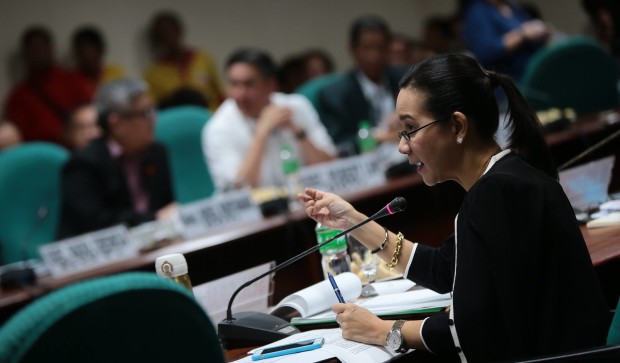Emergency powers bill advances to plenary
Senator Grace Poe, as chair of the Senate committee on public services, finally endorsed for plenary consideration on Wednesday a bill granting President Rodrigo Duterte emergency powers to address the traffic problem in the country.
“We are granting emergency powers because Congress needs to do its part in helping address traffic. But we also expect the Executive department to do theirs,” said Poe as she sponsored on the floor Senate Bill No. 1284 or “An Act Compelling the Government to Address the Transportation and Congestion Crisis Through the Grant of Emergency Powers to the President.”
READ: Senate tackles Duterte ‘emergency powers’
“If this bill passes into law, then the Executive department will no longer have an excuse and should stop pointing fingers as to its inability to address the traffic crisis in the country,” she said.
If approved, Poe said, the emergency powers should be valid and effective until the next adjournment of Congress—or in June 2019 “unless sooner withdrawn by Congress.”
Under the bill, she said Duterte, through his appointed Traffic Crisis Manager, is authorized to use alternative methods of procurement such as selective bidding, direct contracting, negotiated procurement and other modes under existing laws to speed up implementation of key transportation projects.
Article continues after this advertisement“Except for the Supreme Court, lower courts are barred from issuing temporary restraining order or preliminary injunction against the government in implementing the projects under the expanded powers,” she said.
Article continues after this advertisementPoe said contracts should be awarded only to contractors with proven competence and experience, qualified personnel, sufficient and reliable equipment and facilities and adequate capitalization.
READ: Duterte emergency power won’t come without conditions—Poe
To ensure that projects are closely monitored, Poe said, a joint congressional oversight panel will be created which will be composed of the Senate public services committee and the House transportation committee, with two members from each chamber.
The Traffic Crisis Manager, under the bill, will be required to submit regular reports to the joint oversight panel on the efficiency and effectiveness of the projects.
Poe said the emergency power will cover not only Metro Manila but also cities near the capital and Metro Cebu.
“The Traffic Crisis Manager may also implement systems and mechanisms in other areas such as Davao, Cagayan de Oro and other highly urbanized cities and municipalities that are suffering from a land traffic crisis based on an existing master transportation plan specific to those areas,” she said.
The bill, she said, also promotes use of alternative forms of working such as telecommuting, carpooling and ride-sharing schemes, flexible working hours and school days and staggered schedules of attendance.
Poe said she expects the Senate to vote on the measure when it resumes sessions in January next year.
This early, however, the senator predicted that the bill would “not undergo smooth sailing” in the chamber. She nevertheless urged her colleagues to do their part in supporting the measure that she said could eventually improve the traffic condition. RAM
